From hard labor to the Gulag: the lives of the inhabitants of Russian prisons and camps on archival photos
In Russia launched a project on the history of the penal system, it was prepared by the Federal service of execution of punishments (FSIN) and the national electronic library (NEB). It includes digitized archives of the XIX — first half XX centuries, which was previously only accessible to a limited circle of researchers.
Among other things, the project has published photos, which depicted the lives of prisoners before the revolution and Stalin era. Unique pictures from places of deprivation of liberty in the beginning of XX century in our gallery.
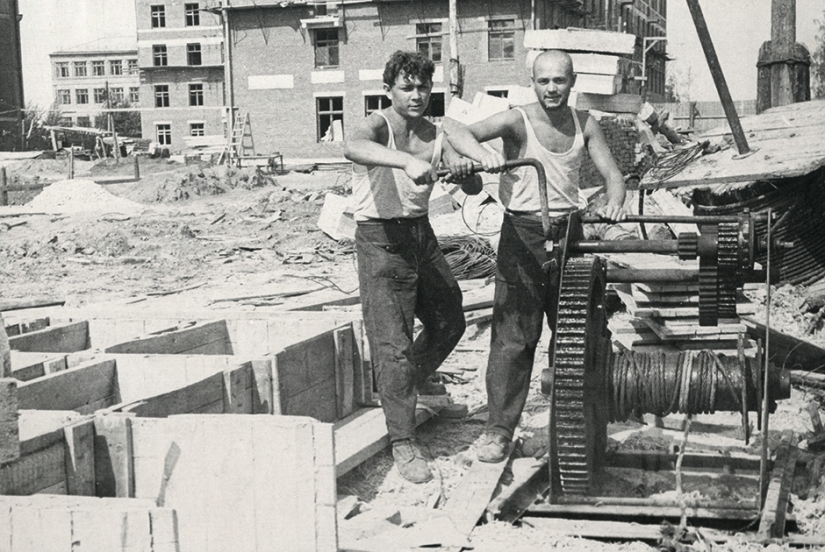
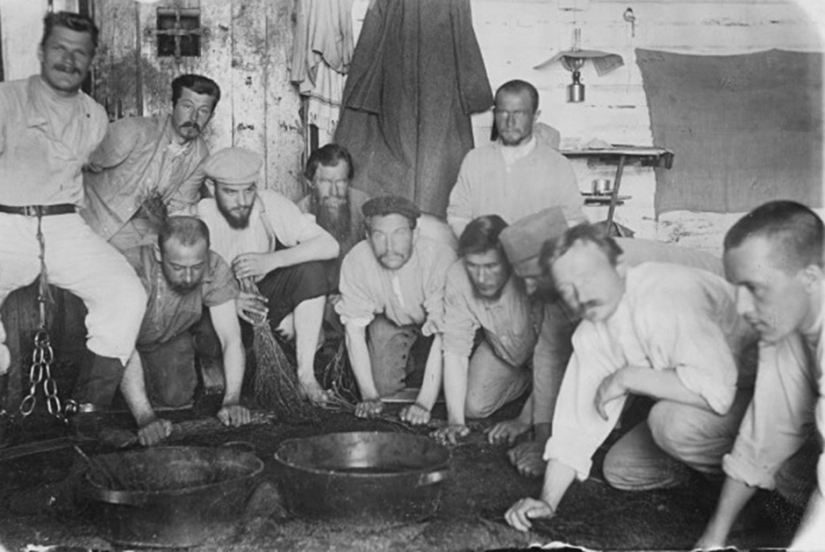
In the bath Prison convict prisons (Nerchinsk mountain district, Transbaikalia). The end of XIX — beginning of XX centuries
Prison (Akathesia) penitentiary — one of the prisons of Nerchinsk hard labor. From 1890 to 1911 there were political prisoners of a male, since 1911 before the revolution a convict prison was female.
In the photo, a group of political prisoners knits brooms. On the left the prisoner wearing leg irons with podkaraulili and podelnikami (the lining under the shackle, to protect the leather) and rawhide strap, allows to hang the chains to the belt.
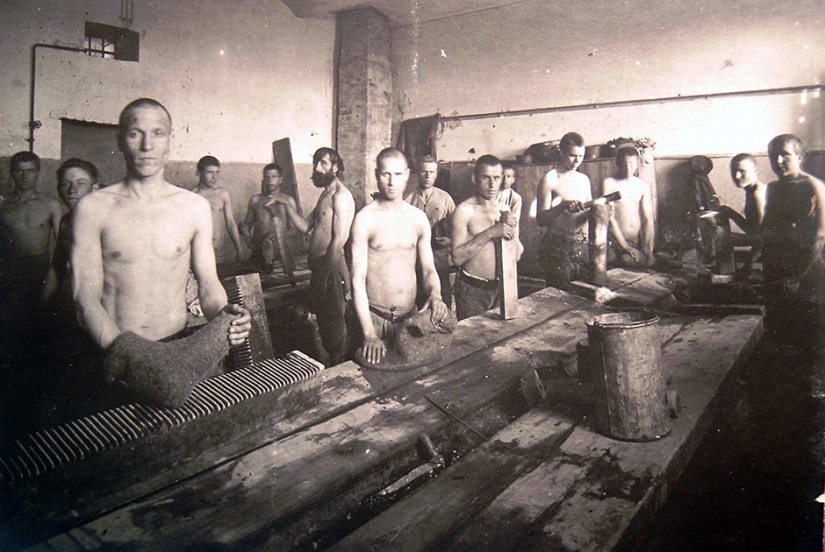
Sunavala workshop Nizhny Novgorod insulator for special purposes. The second half of 1920-ies
Insulators for special purpose entered in the Soviet system of punishments and Correctional-labour code of the RSFSR in 1924. Here are included persons sentenced to imprisonment with strict isolation, which did not belong to the class of workers and have committed crimes "by class habits, attitudes and interests."
In the photo the prisoners made boots from wool by means of special instruments — massive wooden rollers. Due to the characteristics of production in the room was constantly high humidity, so the prisoners had to work naked to the waist.
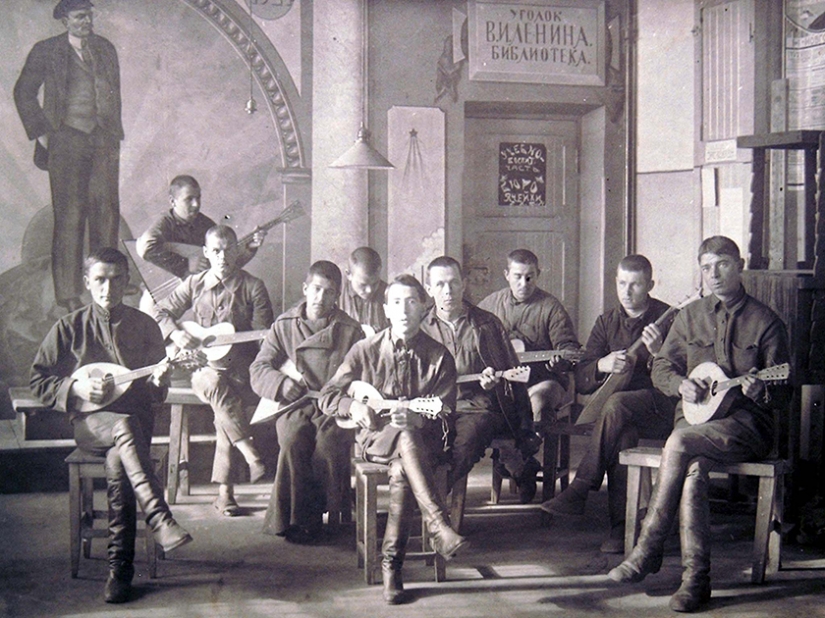
String orchestra prisoners of the Nizhny Novgorod detention facility special purpose in the premises of the club. The second half of the 1920s gotovlus insulator was part of the cultural-educational Department. On its base was created mugs, dramatic, musical, choral and even a circle of atheists. Used prisoners and the library club.
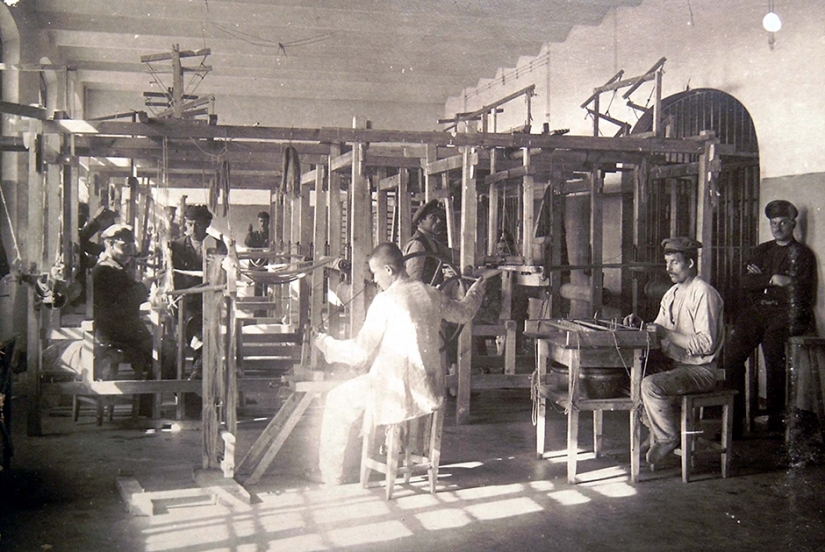
Weaving workshop in the Nizhny Novgorod detention facility special purpose. The second half of 1920-ies
Prisoners work on hand looms in a specially equipped workshop under the room. Their work is watched by the guards.
Starting with the 1910-ies of the staff were forbidden to log in to the prisoners with weapons, because there were cases when because of him, the inmates attacked the staff and even killed them. Therefore, the armed guards were backed by unarmed colleagues with special balconies or from an adjacent room, separated by bars.
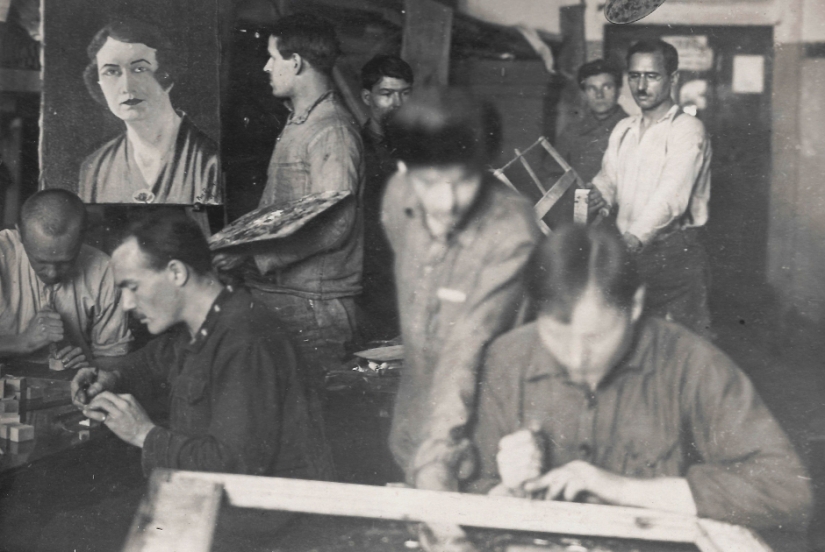
Artistic-production workshop of the Sverdlovsk insulator for special purposes. 1925
Enclosed with the palette in hand writes portrait of a woman, the rest are busy making the frames and subframes. In the background is the employee of the detention center in uniform headdress.
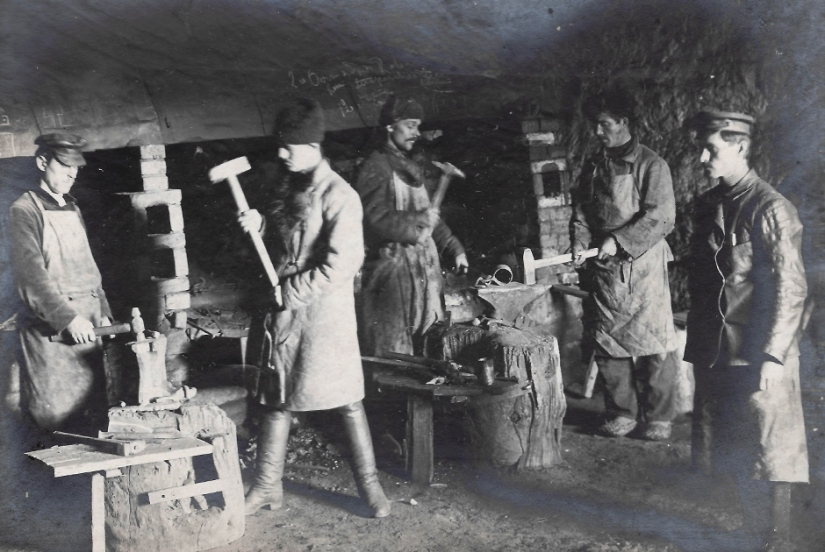
Forge Sverdlovsk insulator for special purposes. 1925. Prisoners hammers at work. To the right is employee of the detention center.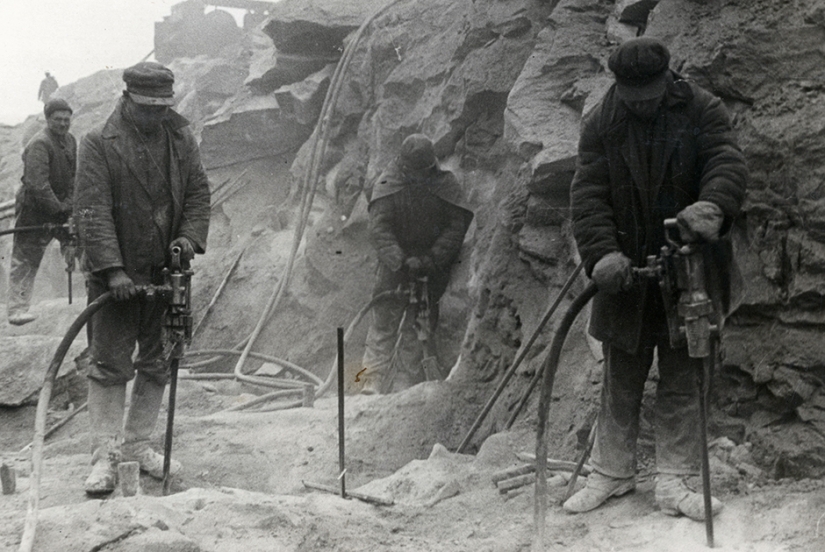
Prisoners on the rock work in the construction of the railway line Forty (now the city of Belozersk) — Obozerskaya. The end of 1930-ies
Prisoners forty-Obozerskaja ITL (Soroca labor camp — Saroglia) prepare the site for the railway tracks. Management Saroglia first stationed in the city of Belomorsk (11 September 1938 — a village of Forty). The camp operated from may 7, 1938 to April 8, 1942.
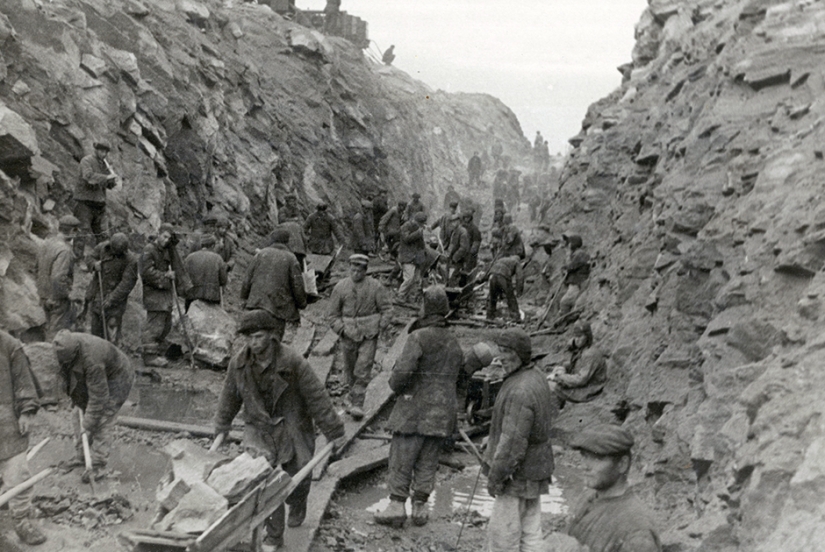
Prisoners on the excavation of the rock during the construction of the railway line Forty (now the town of Belozersk) — Obozerskaya. The end of 1930-ies
Prisoners technici from Sorocea take out pieces of rock on Grabarka (cars) on a wooden footbridge. The convict labor was used mainly for railway construction of the second track of the railway of Forty — Murmansk railway Forty Plesetskaya and the railway line Forty — Obozerskaya connecting the Kirov and the Northern railway.
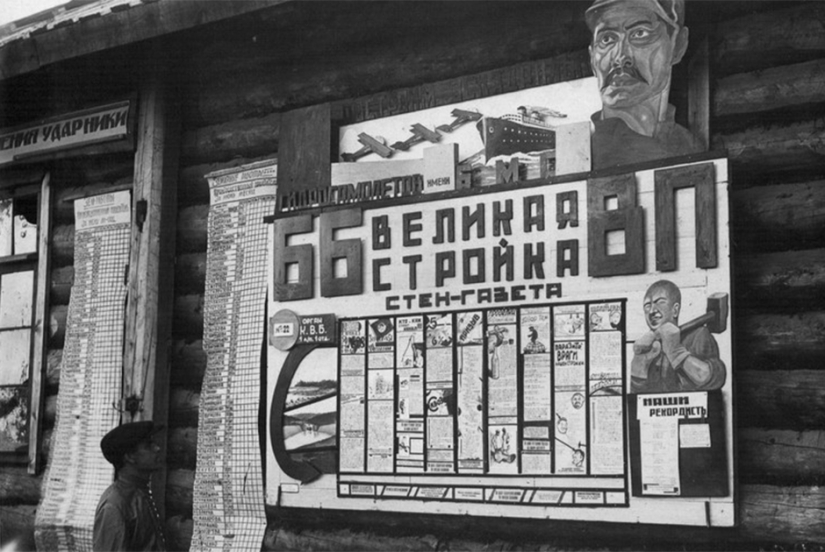
The newspaper of camp point № 1 "the Great construction BIT (white sea-Baltic waterway)". July 1932
Photo from the Directorate of lock No. 2 in the village of Povenets (white sea-Baltic corrective labor camp). Labor camp operated from 16 November 1931 to September 18, 1941, the prisoners were employed on the construction of the white sea-Baltic canal (BBK).
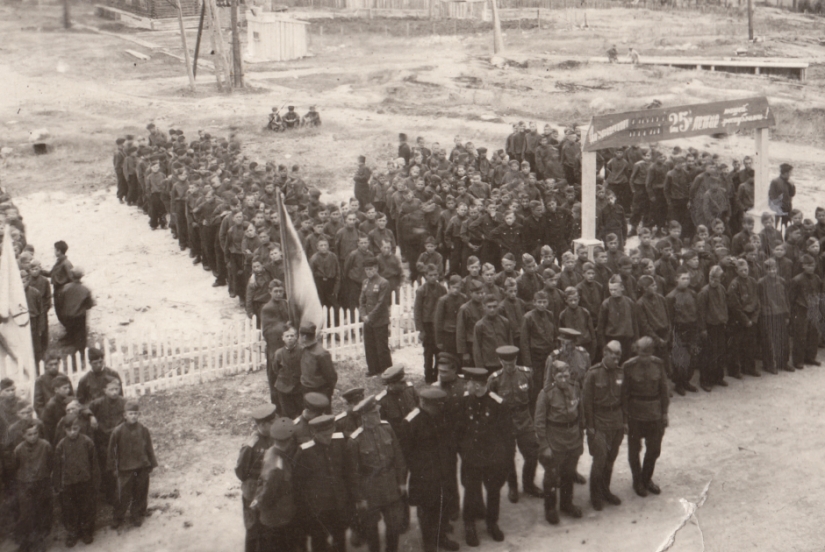
Construction of personnel and pupils of Nadvoitsky children's labor colony. The Karelo-Finnish SSR, 1949
Nadvoitsky children's labor colony (MBC) was organized in 1939 on the basis of a separate camp point white sea-Baltic sea labor camp where I was headed minors. Pupils of the colony worked mainly on Nadvoitsky furniture factory.
In the photo — several columns of pupils DTK dressed in pants, tunic without insignia and caps. The leftmost column is under the banner of proletarian sports society "Dynamo".
In the foreground is a group of officers, sergeants and rank and file members of the colony. Visible rewards for participating in the battles of the great Patriotic war. Shoulder straps for officers of ITL was introduced in April of 1943 — soon after their appearance in the red army (January 1943).
Nadvoitsky DTK eliminated on 18 December 1959.

Prisoners-fitter in the construction of residential houses in Moscow. 1956
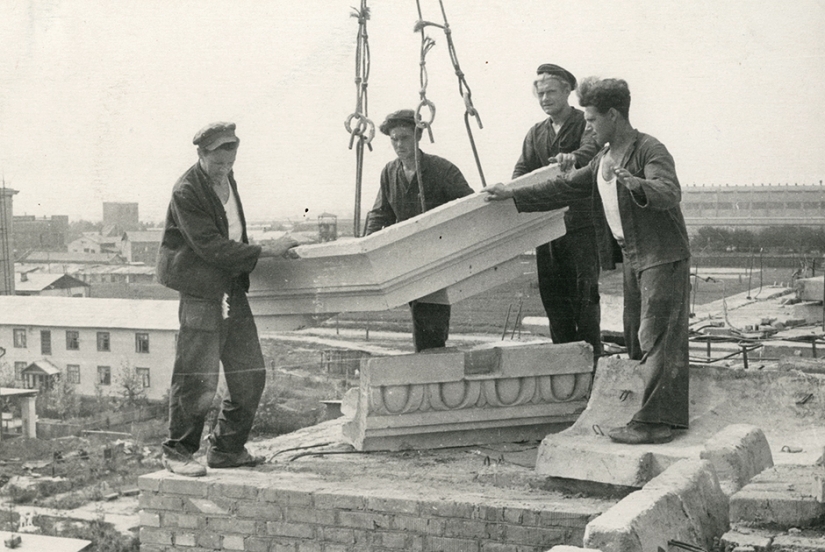
Prisoners for installation of eaves of the fifth floor of a residential building in Moscow. 1956
In the photo — Bukowski prisoners of the correctional labour camp (ITL). The camp is stationed in the town of Kuntsevo, and later — in a Working village (now a district of Moscow). The labor of prisoners of labor camps were used in both military and civil construction. The maximum number of prisoners in 1954, reached 23 thousand people.
Keywords: The GULAG | Russia | Prison | Photo archives
Post News ArticleRecent articles

It's high time to admit that this whole hipster idea has gone too far. The concept has become so popular that even restaurants have ...

There is a perception that people only use 10% of their brain potential. But the heroes of our review, apparently, found a way to ...
Related articles

Photographer Adam Hinton has taken a series of mesmerizing portraits of members of the Mara Salvaruch, also known as MS-13 — one ...

As a child, his mother called Sean Vincent Gillis "a baby with an angelic face" and did not even suspect that her child would turn ...

In Imperial times women had no power over him. The sphere of influence of the peasant and the boyar wives was limited to raising ...

New Year's is a time to surprise and delight loved ones not only with gifts but also with a unique presentation of the holiday ...